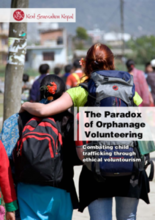In recent years, Nepal has seen a dramatic increase in the number of children who are separated from their families to live in orphanages. During the 10 year civil war, which ended in 2006, many child traffickers coerced parents into giving up their children by posing as boarding school representatives and promising parents their children would be taken to live in safe and modern boarding school facilities. Even after the conflict, this practice continues as traffickers offer promises not only of safety from violence but also high-rate education. Next Generation Nepal estimates that about 15,000 children are living in registered children’s homes and orphanages, and that two out of three of those children have at least one living parent.
Next Generation Nepal (NGN) suggests that this increase in orphanage trafficking and child institutionalization is closely linked to the phenomenon of orphanage voluntourism. Orphanage voluntourism refers to “a spectrum of activities related to the support of orphanages and children’s homes by individuals who are primarily, or were initially, tourists on vacation,” says NGN. Most of Nepal’s orphanages are located in areas of high tourism and NGN has received several reports of orphanage managers asking for more children who look especially “poor” and even keeping children in destitute or unhealthy conditions in order to appeal to donors and volunteers.
NGN, therefore, suggests a shift in this voluntourism practice to one of “ethical voluntourism,” or a set of volunteering activities that do not harm the host community and that improve the lives of people in the community, especially by promoting families to stay together. In this report, NGN provides examples of ethical voluntourism and issues recommendations on how to improve ethical voluntourism practices. The report concludes with NGN’s own thoughts and advice on how to conduct ethical voluntourism. “ By practicing ethical voluntourism,” says the report “NGN concludes that orphanage trafficking and the unnecessary institutionalization and abuse of children in Nepal can be reduced.”

